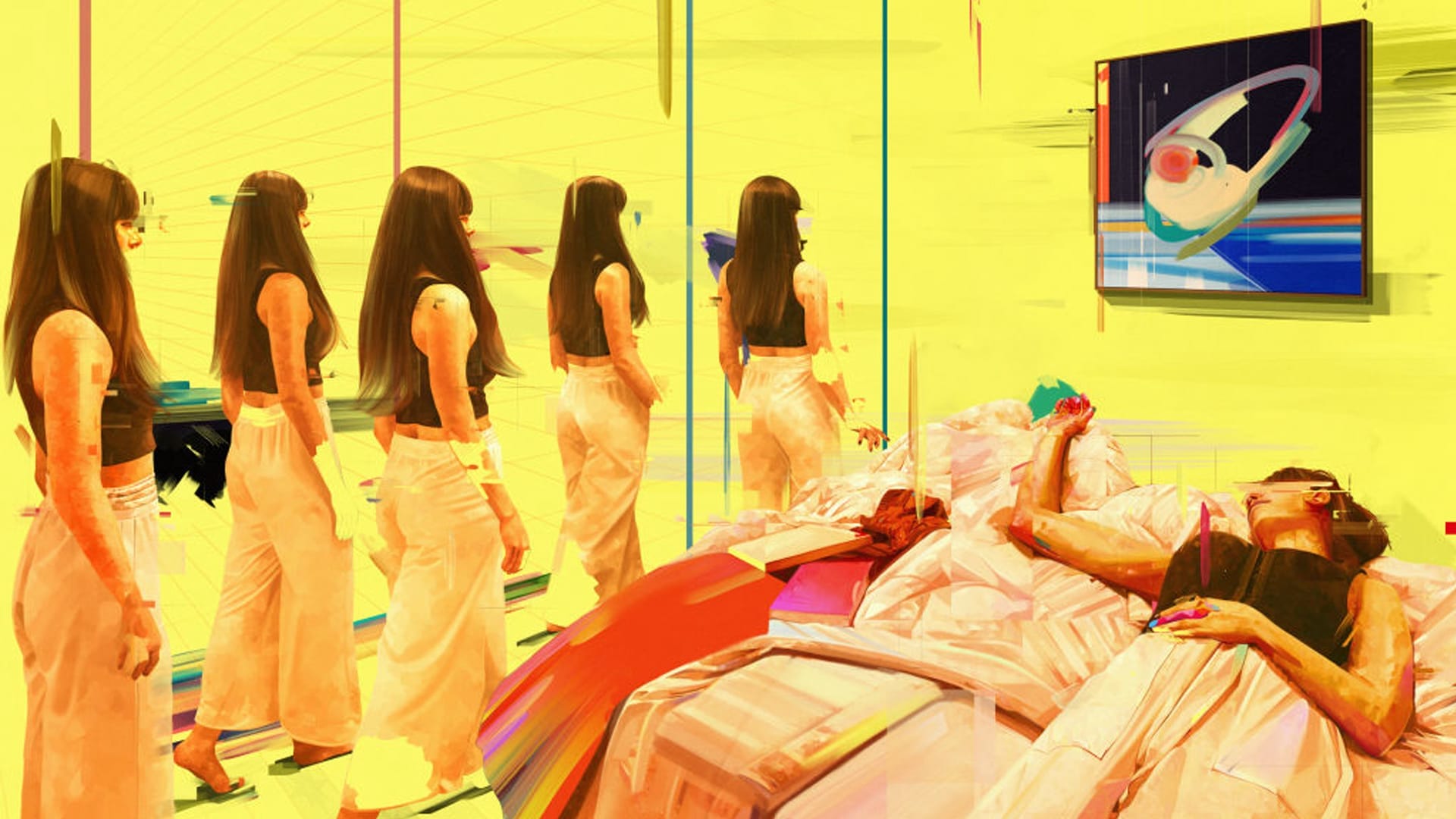
Kate Mosher Hall at Hannah Hoffman Gallery, Los Angeles
“Never Odd or Even” by Kate Mosher Hall, at Hannah Hoffman Gallery, Los Angeles, February 17 – March 23, 2024.
The medium we make when are bodies are shaking There are five archetypes of pillow-talk. There is the confessor, the philosopher, the playful one, a silent-exhausted, and a silent-unhappy. Pillow talk is my favorite form of talking. It’s talking in the wet. It’s talking after the end. A formless kind of speak. Maybe it’s a fantasy of talking outside a container.
So, what is a medium? A psychic, a materiality, something in between? You and I work between mediums. It makes it hard to say out-loud what we are doing without roping-in the fantasy of making outside a container. Kameelah Janan Rasheed gave context to her recent poetry, “I find boundaries erotic.” Whoa, boundaries are erotic.
Limitations make you adjust to the possible and create something from within the bounds. It’s a game with the possible. Rules can make the encounter very sexy. And so, a wildness comes roaring out from the limit. Without the limit, can we name such a wildness? Does wildness need something to thrash against? Your paintings remind me that I am moved by artworks that deal with instability. The question of where art meets uncertainty is a question of boundaries. How much grounding is needed to work with instability? What containers are necessary to hold it, talk to it, and harness the cacophony of being alive right now? Frames allow us to hold our brokenness and witness it safely.
To paint and make and move our bodies into disorganized and reorganized placements. In Qi Gong, we shake and twist and breath and pant. It grounds us but also frays the edges of our bodies. Ideally, it turns the whole body into an ear. Which is to say, trust. Which is to say, erotics. Your paintings feel like the medium we make between our bodies when we’re shaking. I’ve been recording and transcribing interviews for an upcoming project. The choreography of transcription begins with the ears: I burrow my air pods in, and plug the voice into my head. I slow down the voice with an audio application, so I can stay in pace. My hands move into near-perfect sync with my ears as I possess and digest speech onto the page. Closing my eyes, I let it take over. I’m flowing with it, much like Qi Gong, when the flow, flows you.
Or like really good dancing, when the dance, dances you. I haven’t totally lost my edges in the transcription, but my sovereignty blurs a bit. I am in sync and in counterpoint. Taking the other in, but not collapsing. And then the mistakes. I am dyslexic; I get lost in the alphabet sometimes. Which is to say, I often travel to the underworld of language and back. In both the Kabbalah and psychoanalysis there is an emphasis on the mystical (re)ordering of language. Associative thinking pulls one into the unconscious or the divine – eh, same thing. In the 2023 film, Anatomy of a Fall, the main character is accused of “plundering” her husband’s idea. Plundering, I love this word. I feel like I might be in my plundering phase. You say, yes, I am in my titillating phase (we both look it up). I just wrote plunder as plummage. Plummage is not a word.
I see that there is plumage (feathers on a bird), but plummage does not exist in the dictionary. It is a new word! It sounds like: to clobber, to squash, to squish and squeeze. One could say, “I will plummage you.” That sounds hot. This is how I plunder: repetition leads to a mistake, which leads to a new word. A snag in language disorganizes my sense-making and reminds me not to take language for granted. The alphabet is a bitch. Let’s repeat until there is a glitch. Follow that glitch into the new, and risk the possibility of not returning to how things were. But we all know things aren’t working.
All glitches point to a break in the rhythm of what has been. And then the question: how can we share in our instability? Or, what Barthes calls disrythmy (described by way of Kate Briggs in This Little Art): “how to find a way of walking (being, living, also reading, writing and thinking) together that might somehow take account for our different rhythms, not through enforced synchronicity, but allowing for them.
-Amanda Horowitz, 2024









fakewhale
Founded in 2021, Fakewhale advocates the digital art market's evolution. Viewing NFT technology as a container for art, and leveraging the expansive scope of digital culture, Fakewhale strives to shape a new ecosystem in which art and technology become the starting point, rather than the final destination.
You may also like
Martin Dörr, Body without Narrator at saasfee*pavillon, Frankfurt am Main
“Body without Narrator” by Martin Dörr at saasfee*pavillon, Frankfurt am Main, 27/02/20
Anna Uddenberg: Sculpting Critique and Invoking Thought
Anna Uddenberg, a Stockholm-born artist currently residing in Berlin, has become a pivotal figure in
Etiene Crauss in Conversation with Fakewhale
Introducing Etiene Crauss Artist: Etiene Crauss – Living in: Brazil Visit Artist Website Etien




